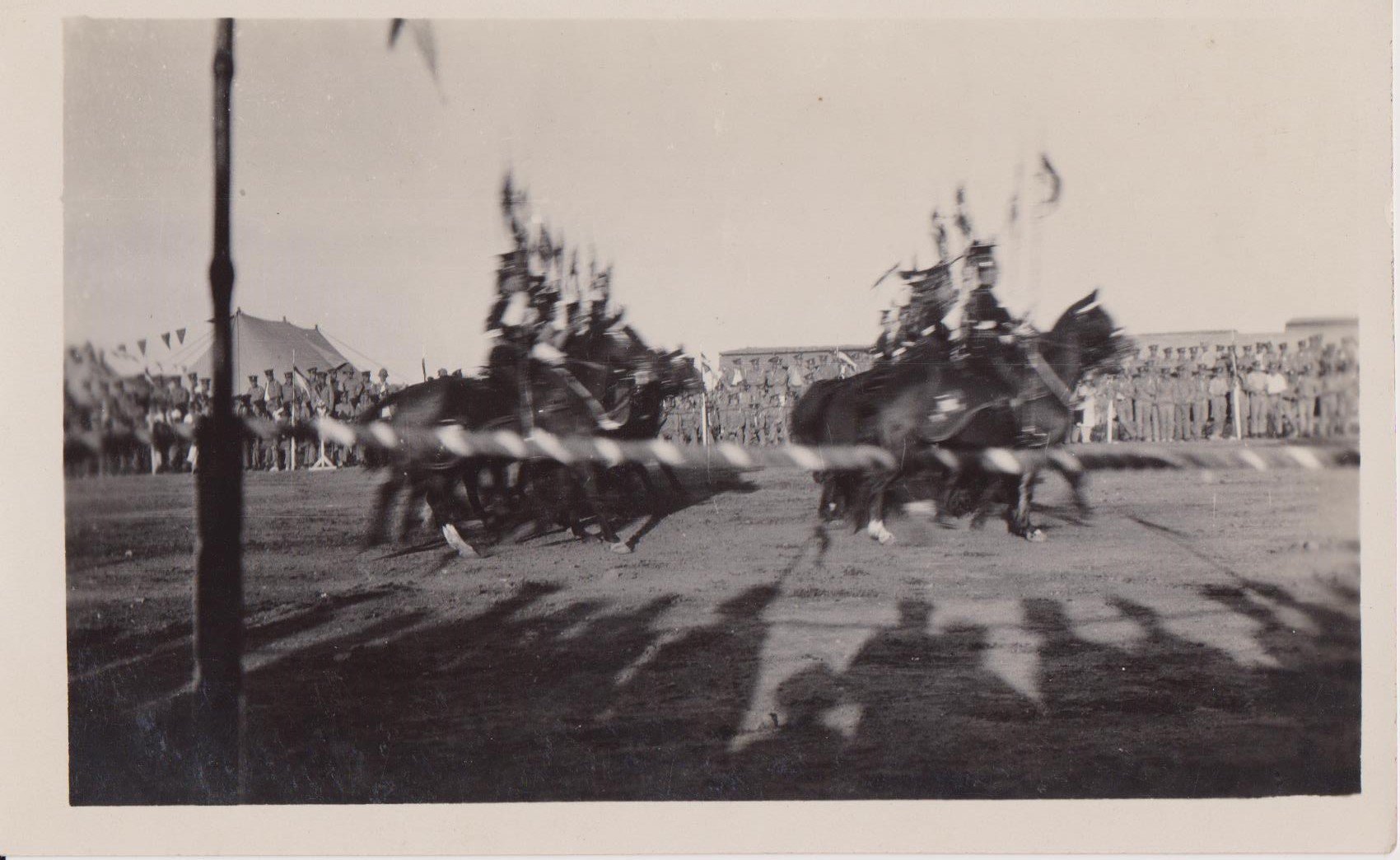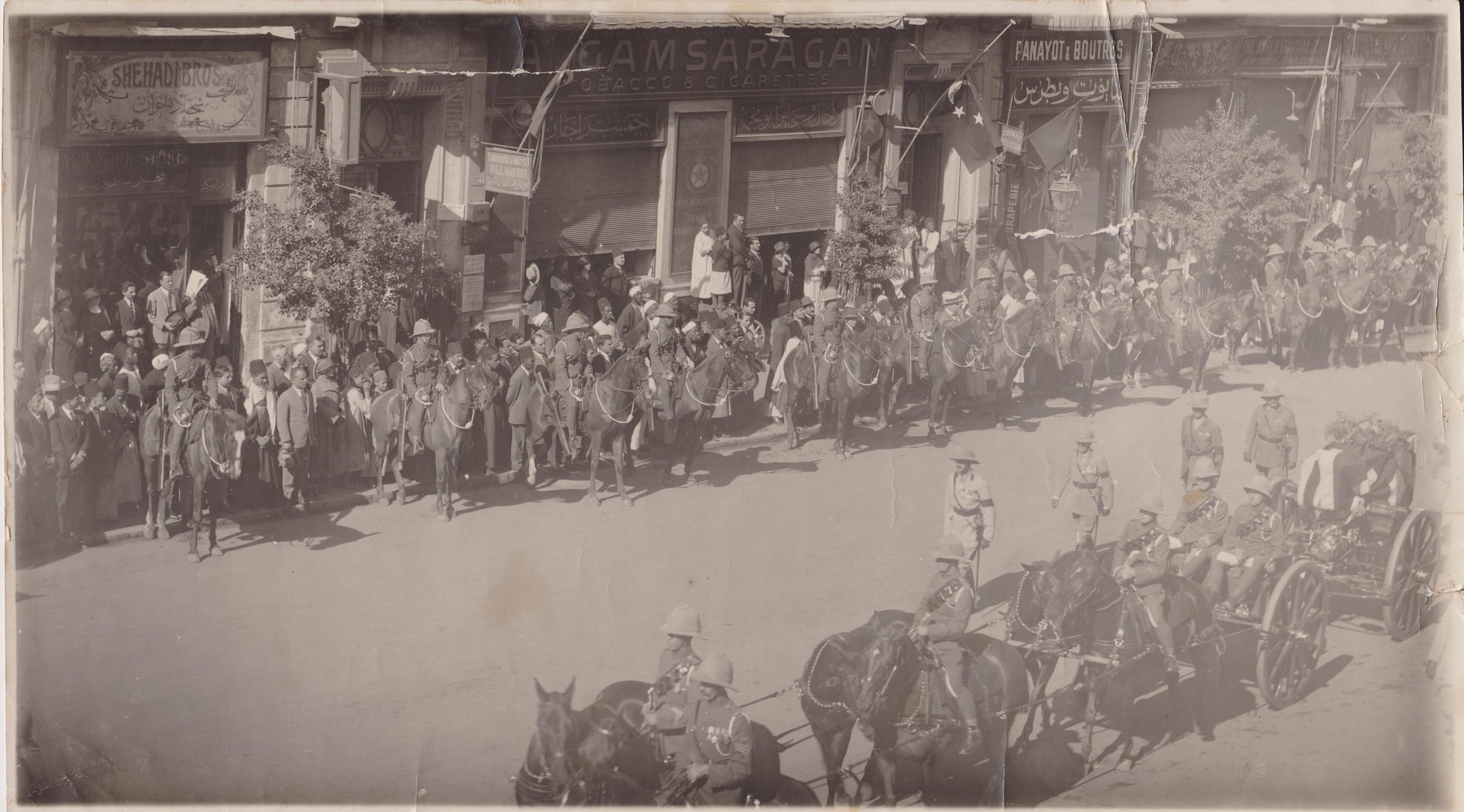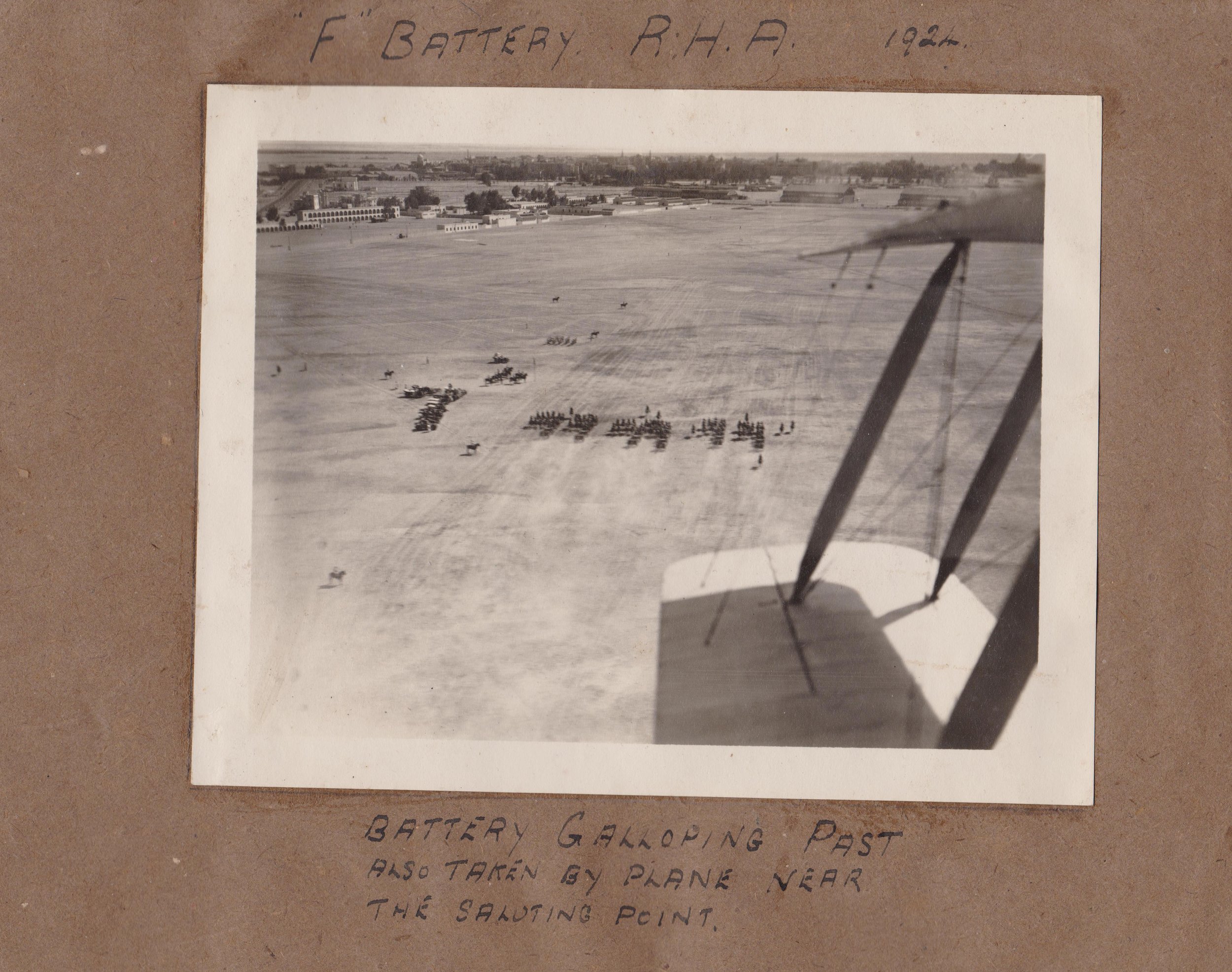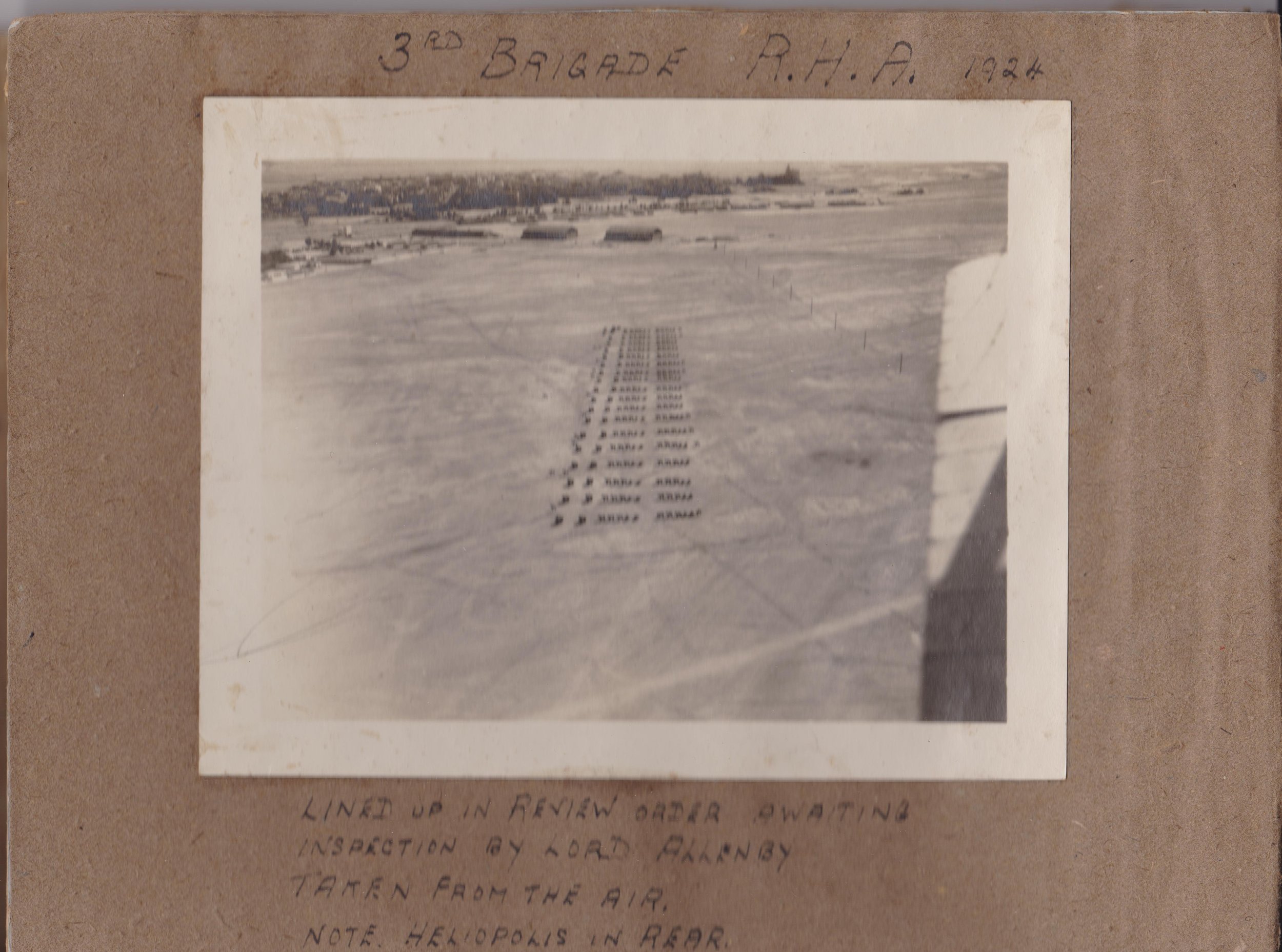After joining up aged 14 in April 1914, My Great Grandfather was posted to the BEF ('J' Battery, then part of 4 Cavalry Brigade) towards the end of WW1, he was posted back to the UK in Feb 1919, and after Signalling training in Swanage, went on to join 'F' Battery later in 1919. They were was posted late in 1921 briefly to Palestine, then in April 1922 to Egypt to form part of 3rd Brigade RHA, 'J' Battery joined 3rd Brigade RHA replacing 'M' Battery late in 1922. 'D' 'F' and 'J' Batteries then formed 3rd Brigade RHA. It was here my Great Grandfather took many photos of 3rd Brigade RHA.
VJ Day - 'Strange Living - Life in a Jap Camp - story of a Aberystwyth Repatriate'
#VJday
Victory over Japan Day is commemorated on the 15th August each year, and marks the end of the Second World War.
Below is a transcript of an article on the welcome received by Capt. Read on his return to Aberystwyth upon his return from 3 1/2 years as a Prisoner of the Japanese at the end of World War 2.
Background
On the same day as the bombing in Pearl Harbour, the Japanese had started their invasion of the Malayan peninsular, threatening Singapore. Captain Read had re-enlisted in 1939 with the 102nd Field Regiment, Royal Artillery, at Aberystwyth, having already spent 25 years in the Royal Horse Artillery), early in 1941, he transferred to the 118th Field Regiment Royal Artillery, part of the newly formed 18th Division, which was to depart the UK late in 1941 bound for the War in the Middle East. However during their journey Winston Churchill decided to send them to the Far East, the war there was not going well there at his point, and Churchill had decided to send additional troops to bolster the defences and hold off any invading forces.
As with the rest of the 18th Division, the 118th were not prepared, trained nor did they have the correct equipment for war in the Far East, nevertheless they landed on 29th January 1942 during Japanese bombing raids of the harbour and , little did they know at the time, just days before the British Surrender on the 15th February 1942. On the 15th February 1942, the British and Commonwealth troops finally surrendered to the invading Japanese troops. The Japanese Commander, Lieut-General Yamashita had successfully led his 30,000 troops to overcome the 85,000 defending allied troops on Singapore.
To this day , it was the largest surrender of British led forces in history. Winston Churchill called it ‘the worst disaster’ in British Military History.
And so started three and a half years as a prisoner of war for my Great Grandfather along with 140,000 Commonwealth troops. The Japanese had refused to sign up to the Geneva convention and many of the camp guards were notorious for their acts of cruelty to their prisoners, the Japanese used the prisoners as slave labour, either on the infamous ‘Death Railway’ built by the POWs between Burma and Thailand or in Japan or their invaded territories.
My Great Grandfather was fortunate to survive the ordeal and was shipped back after the Japanese surrendered in August 1945. Upon his return to the UK in late November 1945, he caught the train home to Aberystwyth. I have an original copy Cambrian News Article dated 7th December 1945 containing an article about my Great Grandfathers return and his time as a POW, he was given a heroes welcome by the town and dignitaries. (Thanks to the National Library and the Cambrian News for permission to reprint this article)
He had never really recovered from his ordeal as a Prisoner though, and in August 1946, he was rushed to Chester Military Hospital again, suffering from what was later found out to be stomach cancer, he died there on the 26th September 1946. He is commemorated on Llanbadarn Fawr War Memorial.
Transcript
Cambrian News and Welsh Farmers Gazette, Friday 7th December 1945. containing an article entitled
'Strange Living - Life in a Jap Camp - authentic story of a Aberystwyth Repatriate'
Strange oddities like snakes and snails being used as foodstuffs and secret listening to the B.B.C. News from wireless sets installed in water bottles and tin cans, these and other thrills were all packed into the life of Capt. Richd. George Read, 3 The Broadway, Llangawsai,,Aberystwyth, whilst a prisoner-of war in the Far East.
Capt. Read arrived home on Wednesday week, and was given a tumultuous reception at the Aberystwyth Station. Owing to misunderstanding his wife, who had travelled to meet him at Shrewsbury, was not present, as the train that carried her husband was not the one expected. Capt. Reed was, however, met at the Station by his two daughters the Misses Eileen and Mary Read, who,incidentally," he said, I could hardly recognise, they had altered so much in that comparatively short time."
En route from Singapore to Madras on the SS "Rajula," Capt Read met Dr. J. M. Cribbs, the ship's medical officer, who, prior to enlisting, was in practice at Aberystwyth, and will be well remembered by the residents. At Bangalore, India, the ex-prisoners were very well looked after and cared for by the Red Cross, and thorough overhaul was given to each man, and it was estimated then they left that most of them had gained about two stone in weight. Capt. Read sailed home on H.M.S. "Llandovery Castle," and arrived at Southampton on Nov. 4th, whence he was moved to Chester Military Hospital before finally being supplied with clothing coupons and such like effects at a Liverpool camp to pre- pare him for a new life in his own country.
Capt. Read, who joined the Army in 1914 as a trumpeter in the Royal Horse Artillery, has now completed 32 years with the Colours and was Lt.-Quarter-master to the 146 Field Regiment at Aberystwyth in 1939. He left this country from Liverpool in October,1941, is the SS "Arcadia," and sailed across the Atlantic to Halifax, Nova Scotia, where the whole company disembarked and boarded the SS "America." renamed 'West Point', which was Americas largest liner. After visiting Cape Town, where the local organisations gave them grand welcome, the troops to whom Capt. Read was attached were given hardening-up training course for three weeks about 100 miles inland from Bombay. Finally, he and his comrades arrived at Singapore on January 29th, 1942, and were subject to heavy aerial bombardment before being captured on Feb. 15th. Spending most of his time as captive in Changi Camp, with but a brief spell at Towner Road Camp, both in the vicinity of Singapore, Capt. Read said to that beriberi broke out in March,1942. This was followed by skin troubles, eye ailments, diphtheria and general malnutrition, in spite of the prisoner's efforts in local gardens, which covered about 150 acres of land, where the captives grew as much as possible of green produce and tapioca, Ceylon spinach, etc. As food supplies decreased the health of the whole camp deteriorated; the fish that was sent in was rotten, but prisoners ate it, including the heads At this stage, Capt Read recalled the wonderful moral of the prisoners, “In spite of the shortage of food and clothing," he said, “We always knew that were on top. and the end for which we all prayed came about by our people arriving and the Japs capitulating. Whilst prisoner of war, we knew that the spirits of the people at home were such that it enabled us to keep our own high.”
Referring to the hidden wireless sets, Cap Read said that they wore made from odd pieces which the men from wireless vans whilst on fatigues and were made secretly in the camp. During the whole time Japanese guards made regular searches, but all proved fruitless.
Speaking on the brighter side of their lives, he said that the British and Australians made up good concert parties, and the Japanese did allow the prisoners to buy material for making instruments, many of which that were used in the orchestra were made by the men, such as basses, 'cellos, guitars, flutes and yin whistles.
As food went down in scale the officers complained, and the Japanese reduced the deductions for food and accommodation, instead of increasing the ration. They invested the remainder of the prisoners work pay, and when their country capitulated they wanted to pay using this money, but their money was worthless.
"I might add” , said Capt. Read, that most of our valuables, such an watches, cigarette cases, lighters, and pens were sold to get food, much of which was obtained through the black market of the Chinese.
Capt. Read was met Aberystwyth Station by the Mayor and Mayoress (Cllr. and Mrs. A. W. Miller), the Deputy Mayor and Mayoress (Cllr. and Mrs. Griffith Davies), Cllr. Emile T. Evans, and a host of old friends and acquaintances. In a car he was slowly driven to his home, where the neighbours had prepared the street with lighting flags, and for a part of the journey headed by the Army Cadet Band, in charge of Drum Major H. Humphreys. “Speaking as an old soldier, said Capt. Read, " I admired very much the turn out of the Band, both their turn out and drill." Capt. Read wishes to thank everyone for their kindness and good wishes. “I was really and truly struck by the wonderful reception” he said.
The Fall of Singapore 15th February 1942
During World War 2, Singapore was known as the ‘Gibraltar of the East’, one of the most important fortified military outposts in the Empire. The Japanese knew though that it was underprepared for any potential conflict, with Britain seeing Europe and North Africa as the more important theatres.
On the same day as the bombing in Pearl Harbour, the Japanese had started their invasion of the Malayan peninsular, threatening Singapore. The 118th Field Regiment Royal Artillery, part of the newly formed 18th Division, departed the UK late in 1941 bound for the War in the Middle East. However during their journey Churchill decided to send them to the Far East, the war was not going well there at his point, and Churchill had decided to send additional troops to bolster the defences and hold off any invading forces.
As with the rest of the 18th Division, the 118th were not prepared, trained nor did they have the correct equipment for war in the Far East, nevertheless they landed on 29th January 1942 during Japanese bombing raids of the harbour and , little did they know at the time, just days before the British Surrender on the 15th February 1942.
(IMAGE 1) Royal Artillery on Elephants in India. My Great Grandfather Lt R G Read (QM) was in the 118th Field Regiment Royal Artillery who were sent to train in India prior to posting to Singapore. Two weeks of ‘intensive training’ was all the preparation that they had for War in the Far East.
My Great Grandfather Lt (QM) R G Read arrived in Singapore on the USS Westpoint disembarking with the rest of the 118th Field Regiment RA on 29th January at Keppel Harbour.
My Great Grandfather kept a diary and he somehow managed to continue to keep these diaries during his imprisonment too.
During those days before the surrender, the Japanese carried our intensive bombing missions on the troops as they disembarked and unloaded their equipment. Here my Great Grandfather writes the relentless bombing by the Japanese including the sinking of a troop ship by Japanese dive bombers and the resulting rescue.
From my Great Grandfather's diary 5th Feb 1942
'Empress of Asia bombed. 6 miles out. Dealt with about 600 survivors as rescued. 'Q' 125 badly injured looks as though he will loose his sight. Later! he has.'
Diary entry dated 6th Feb 1942
‘We loose 5 at docks whilst unloading by 27 bombers, no resistance from RAF’
Diary entry 14th February 1942
‘Casualties amount to 20 odd dead+many wounded, Capt Martin 259 killed’
(IMAGE 2) Here is my Great Grandfather in Singapore, just after his arrival in January 1942. .
As my Great Grandfather was the Regimental Quartermaster, he had access to communications received by the Regimental HQ,.
Here is a Telegram written by General Wavell (Commander in Chief at the time), and his last order before the surrender sent on the 10th February 1942, just days before the surrender on the 15th Feb, containing the instruction;
'Commanders and Senior Officers must lead their troops and, if necessary, die with them. There must be no thought of surrender and every unit must fight it out to the end and in close contact with the enemy.'
(IMAGE 3)Telegram from General Wavell, Commander in Chief, Southern Pacific, dated 10th February 1942.
As the Japanese invasion reached the final stages, communications were sent offering terms for the surrender of the Garrison
This telegram presenting an ‘Admonition of Peace’ inviting the Allied forces to an ‘honourable’ surrender. It also attempts to give assurances as to how well that they will treat them upon their surrender.
‘Upon my word we won’t kill you, treat you as officers and soldiers if you come to us, But if you resist against us we will give swords’
(IMAGE 4) Telegram from the ‘Nippon Army’ inviting the surrender of the allied troops in Singapore, dated 13th February 1942
On the 15th February 1942, the British and Commonwealth troops finally surrendered to the invading Japanese troops. The Japanese Commander, Lieut-General Yamashita had successfully led his 30,000 troops to overcome the 85,000 defending allied troops on Singapore.
To this day , it was the largest surrender of British led forces in history. Winston Churchill called it ‘the worst disaster’ in British Military History.
(IMAGE 5) Transcript of the Invitation of surrender of Allied Forces, on the 15th February 1942 at 5.30pm, written by Lieut-General Tomoyuki Yamashita, ‘High Commander of Nippon Army’
Here is the diary entry from the date of the Surrender to the Japanese on the 15th February 1942
‘The Surrender of Singapore to Japan.
“B” Echelon to report to RHQ at Thompson Road.’
(IMAGE 6) Diary entry by Lt. R G Read dated 15th February 1942
Telegram written by Lieut-General A. E. Percival (General Officer Commanding (GOC) Malaya) , explaining the reasons for surrender to Japanese Forces
‘The essential of War have run short, In a few days we shall have neither Petrol nor Food. Many types of ammunition are short, and the water supply, on which the vast civilian population and many of the fighting troops are dependent, threatens to fail.’
(IMAGE 7) Telegram from Lt Gen Percival
And so started three and a half years as a prisoner of war for my Great Grandfather along with 140,000 Commonwealth troops. The Japanese had refused to sign up to the Geneva convention and many of the camp guards were notorious for their acts of cruelty to their prisoners, the Japanese used the prisoners as slave labour, either on the infamous ‘Death Railway’ built by the POWs between Burma and Thailand or in Japan or their invaded territories.
My Great Grandfather was fortunate to survive the ordeal and was shipped back after the Japanese surrendered in August 1945. Upon his return to the UK in late November 1945, he caught the train home to Aberystwyth. I have an original Cambrian News Article dated 7th December 1945 containing an article about my Great Grandfathers return and his time as a POW, he was given a heroes welcome by the town and dignitaries.
He had never really recovered from his ordeal as a Prisoner though, and in August 1946, he was rushed to Chester Military Hospital again, suffering from what was later found out to be stomach cancer, he died there on the 26th September 1946. He is commemorated on Llanbadarn Fawr War Memorial.
75th Anniversary of VJ Day - 15th August
In the run up to the 75th Anniversary of VJ Day Here are my Great Grandfather’s Diary entries in the lead up to the surrender of the Japanese, whilst he was a POW in Changi, 1945.
2nd August - ‘Weight about the same, but very weak condition, Hope released soon’
11th August - ‘Have GREAT News, hardly believable yet. Tummy still bad’
12th August - ‘Great excitement at camps, Rumours galore.’
13th August - ‘Still exercising precaution’
14th August - ‘Extra 50gms of Rice. ““ 20gms of oil. Issued on the QT “ The Excelient’
15th August - ‘Kent Revally at 8.30’
16th August - ‘ Nothing Official yet’
17th August - ‘Pretty well certain.’
18th August - ‘These days of uncertainty have a telling effect’
19th August - ‘Rumours run wild but biding till time.’
20th August - ‘nothing issued by Gen. Saito’
21st August - ‘Still anxious’
22nd August - ‘Another day of whispering but OK’
24th August - ‘Outside camp Outram Road prisoners return, Now 12,000 food=clothing pouring in. Cig issue. Cables sent 21/8 V. happy attending in Pow…Troops well behaved up till now.
25th August - ‘
26th August - ‘ all good news now. Fish 1g
27th August - ‘31 years service today, feeding on Red+ parcels 1 to 20, Butter and cheese issue extra’
28th August - ‘Sime Road + rest camps. 1st Liberator over, pamphlets dropped …… to POW’s. Tummy much better, but not…’
'Patria' Cairo stopover of the long distance flight between Lisbon to Macau, Breguet Bre.16Bn2 "Patria" ("Patria I") of the Portuguese Air Force
Here is picture from my Great Grandfather's archive this time a Portuguese aircraft on a long distance flight to Macau. This is Breguet Bre.16Bn2 "Patria" ("Patria I") of the Portuguese Air Force. Used to attempt the first Lisbon-to-Macau flight, starting 7 April 1924. Crashed in India 7 May 1924. The pilots were Brito Pais and Sarmento de Beires.
Here it is possibly refuelling on a stop-over in Cairo, which is where my Great Grandfather was stationed with the Royal Horse Artillery. Many overseas airforces made use of the British facilities around the globe it seems!
My Great Grandfather took photos of many of these long distance flights during his 10 years in Egypt.I think he may have flown himself as there are many aerial photos of Egypt in his archive.
Interview in The Times 3rd April 1924
'A LISBON-MACAO FLIGHT. (FROM OUR CORRESPONDENT.) LISBON, APmx 2. The mnilitary airmen, Captain Brito Paia and Lieutenant Sarmento Beires, leave Amadora, near Lisbon, this after- noon in the Breguet biplane " Patria " for Macao. The route arranged is as foDows :-Villa Nova de Eilfontes, Oran, Kairawan, Gabes, Tripoli, Benghazi, Cairo, Damascus, Baghdad, Basra, Bander Abbas, Karachi, Delhi, Calcutta, Rangoon, Bangkok, Hanoi, Canton, and macao.'
Abstract from 'The First Aerial Raid From Portugal to Macau' https://www.researchgate.net/publication/270881729_The_First_Aerial_Raid_From_Portugal_to_Macau?fbclid=IwAR1XQ59jzIx2f6hzv7oWsTKZzl03hiDj6EjKEImpbLsmsXRLpq3SYofC7Mw
FEPOW - 75th Anniversary of VJ day 2020
This photo was in my R G Read’s archive and features a group of POW’s with their Japanese Guards, the photo is dated on the back ‘Apr ‘44’ but my research would indicate that it was most likely taken in 1942, as the prisoners look fit and healthy. As the years went by the prisoners health deteriorated so that by 1944, it would be unlikely that they would still look relatively fit.
Research indicates that this is most likely a ‘work party’ sent out to clear up in the aftermath of surrender, so post 15th February 1942. The terrain in the photo points to it being in the Bukit Timah area of Singapore.
These type of ‘propaganda’ photo’s were taken by the Japanese to illustrate how ‘well’ prisoners were being treated, when in actual fact the opposite was the case.
Also of interest on the photo are what look like initials in a fairly small font beneath each prisoner, the ink used may have been whatever was at hand and so may have long ago disappeared, but a number of imprints can be seen. I would like to further research these and possibly then identify the prisoners.
Sir Lee Stack
The Funeral cortege of Sir Lee Stack, Governor General and Sirdar of the Egyptian Army, passing through Cairo on the 22nd November 1924. Stack was assassinated while driving through Cairo on 19th November 1924. The Royal Horse Artillery formed the cortege, this included my Great Grandfather, Richard George Read who at that time was L/Bdr of 'F' (Sphinx) Battery, Royal Horse Artillery. This photo is part of my Great Grandfather's archive
HMS Renown flypast and RHA signalmen flying with the RAF
HMS Renown passing Ismailia on the Suez Canal c.1922 with a flypast of RAF Avro 504's, probably after collecting the Prince of Wales at Port Said. Image 2 - My Great Grandfather standing next to Avro 504k H6596 in Egypt, in 1922 I believe. This aircraft is possibly in another photo of his of a flypast over HMS Renown when the Prince of Wales boarded at Port Said in 1922 .
He was based in Egypt 1922-30 as a Signalman in the Royal Horse Artillery, I understand that in the early days of the RAF Signalmen from the RHA were used by the RAF on flights, though I cannot confirm that my Great Grandfather performed this duty. There are many aerial photos from this period in his archive indicating that he at least had a keen interest in Aerial photography. My Great Grandfather was R G Read and joined the RHA in 1914 aged 14, serving in the BEF later Palestine and Egypt until 1936, he re-enlisted in 1938 in the RA, but was captured at the fall of Singapore in 1942, where he spent the rest of the war as a POW, he survived and returned home to Aberystwyth but sadly died in 1946.
Aberystwyth Memories in Changi POW camp, Singapore 1942-45
Tuesday 26th January 1943
At 8:20pm letter from Hilda (Richards Sister) dated July 11th received. First since leaving home. Am so pleased to hear all are well at Aber and elsewhere. Many of my pals had to read it, I’ve already been over it half a dozen times. Next one must be from Marion (Richards Wife)!
118th Field Regiment Royal Artillery
WW2 Service records of R G Read
Read More










